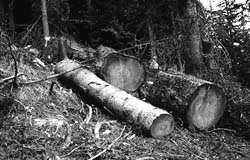Touch
 france's forests have come a long way. From being heavily exploited before the 18th century for primarily firewood, they are currently expanding at the rate of approximately 37,000 ha per year. The condition of the country's forests may have changed, but France's common people are yet to assert their rights over them.
france's forests have come a long way. From being heavily exploited before the 18th century for primarily firewood, they are currently expanding at the rate of approximately 37,000 ha per year. The condition of the country's forests may have changed, but France's common people are yet to assert their rights over them.
Until the 18th century, forests comprised the centre of French policy. The economy depended heavily on the use of the natural environment. The army needed warships and weapons, people demanded furniture and fuel for cooking and these were just some of the basic uses to which wood was put. Not only was there a demand for large quantities, but particular varieties of wood were sought: for instance, elm wood was needed for cannons and walnut wood for the hulls of ships.
Forests were also the focus of public policy because at the heart of the economy was their close connection with agriculture. Cattle often strayed into forests to graze because of the reduction in pastures (taken up for agricultural purposes). Usage rights over forests and commons were essential to poor peasants who did not own land.
From bad to worse Heavy pressure on the country's forests resulted in a severe shortage of wood, which in the late 18th century, snowballed into a social crisis. The combined onslaught of industrialisation and the French revolution was more than France's forests could take. The balance between forests and society went haywire. The depletion of forests, disruption of usage and ownership rights and the appropriation of common lands forced many a poor peasant to head citywards. Private ownership of forests and cultivated lands exten-ded to the detriment of the poorest.
Those who had neither land nor purchasing power, that is the factory workers and poor peasants bore the brunt of it all. Rural folk who complained about industrialisation were the very ones who had to work in city downtowns, in factories. The social crisis worsened because firewood prices had been hiked and the poor did not have enough to warm themselves. The situation was aggravated by the fact that the consumption of firewood in the cities increased. The French consumed an average of 20 million tonnes per year and 10 per cent of this was used up by the inhabitants of Paris alone. Largescale clearings lessened only later when agricultural methods improved and resulted in a reduction in fallows and yields increased.
The energy crisis was finally resolved, but its social fallout could not be mitigated easily. Soon, coal replaced firewood, but the conditions of small peasants only seemed to get worse, so that tensions sharpened. As economist Alain Le Sann explains, "At the end of the 19th century, some villages in the Pyrenees proclaimed their independence in order to retain access to forest resources. But thanks to the Code Forestier of 1827, the state was now the new bully as it used all its might to prevent peasants from using forest resources and common meadows. Since the state got all the ruling power on forest areas, rural communities weakened and broke up." As a result, conflicts over land use abated because the country became deserted.
French forests began expanding from around the mid-19th century, invading fallow lands abandoned by small peasants. Andre Brun an economist at the National Institute of Agronomic Research, explains that the expansion of forests symbolises the relative fading of agriculture in the economy. The destinies of forests and agriculture were dissociated.
Farmers today still own woody lands (more than half the land under forests), but they represent only 10 per cent of the population. Although they provide rural folk with a little firewood, gas is what most use to warm themselves. Forests are now a hunting preserve for French farmers. And hunting is a favourite pastime in France.
Not just agriculture but even the economy at large does not hinge on forests any longer. The wood of forests is used for purposes like paper and furniture making. Ironically lumbering is quite a difficult and therefore expensive proposition because forests stand on abandoned lands with steep inclines and poor soil.
The state is now the foremost manager of France's forests. The Office National des For
Related Content
- Order of the National Green Tribunal regarding medical waste from Kerala dumped in Tamil Nadu, 19/12/2024
- Judgment of the National Green Tribunal regarding sewage discharge into storm water drains which meet river Yamuna, 21/11/2024
- Order of the National Green Tribunal regarding pollution caused by Talcher Coalfield under Mahanadi Coalfields Limited, Angul district, Odisha, 06/03/2024
- Order of the National Green Tribunal regarding dumping of waste on the banks of river Baigul, Rudrapur,
- Transforming our world: interdisciplinary insights on the Sustainable Development Goals
- World disasters report 2022
